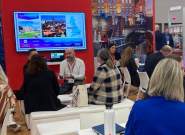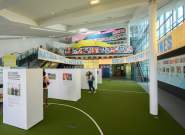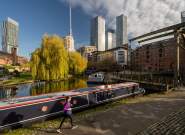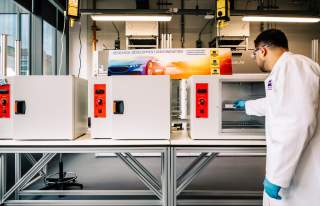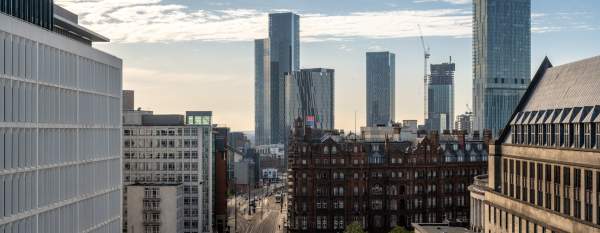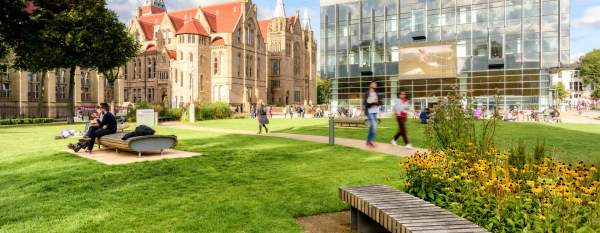Birthplace of the Industrial Revolution, Manchester was the world’s first industrial city, with the first factories and industrial estates; it’s where Ford built their first cars in Europe. Today, the city is at the heart of the UK’s largest manufacturing and advanced engineering cluster - the Northern Powerhouse and is the gateway to the North West, the rest of the UK and Europe.
Home to leading brands
The region’s supply chain, talent and access to market are why businesses such as Jaguar Land Rover, ARM, AECOM, BAE Systems, Balfour Beatty, Cargill, Heinz, Hitachi, Jacobs Engineering, Kellogg’s, NXP, Siemens, Unilever and WSP Parsons Brinckerhoff have a presence here.
Highly skilled talent
Our region has some of the best global talent in the field. five universities which collectively have 25 Nobel Prize winners, over 100,000 students, 14,000 students studying STEM subjects and specialist strengths in advanced manufacturing, advanced materials, 3D printing, data analytics and electronics. Manchester also has a highly skilled manufacturing workforce of nearly 115,000 people working in areas as diverse as aerospace, defence, electronics systems, software engineering and transport.
Advanced Materials
Complimenting the city’s innovation and expertise in Graphene, Manchester is home to an advanced materials cluster with research strengths in technical textiles, surfaces and coatings, composites and light alloys. There is also a range of research assets that businesses can access, including the UK’s Centre for advanced materials – The Henry Royce Institute – in addition to Europe’s largest school of materials based at the University of Manchester.
£61 million has been invested into the National Graphene Institute (NGI) at The University of Manchester which is focused on research into the applications of graphene. Over 40 companies are already working with over 200 researchers to shape the materials future development.
Opened in December 2018, the GEIC is critical for the development of commercial applications for graphene and other 2D materials. It is The University of Manchester’s second facility and focuses on pilot production and commercialisation within the industry. Combined with the NGI, this gives Manchester a globally unrivalled concentration of graphene expertise.
The Henry Royce Institute is the UK’s National Institute for Materials Science Research and Innovation. Research specialisms include 2D materials, advanced metals processing and atoms to devices. The Institute gives businesses access to state-of-the-art equipment and facilities and is continuing to grow available assets.
Lightweighting
Manchester is at the heart of the largest aerospace cluster in Europe and the UK’s second largest automotive cluster, offering easy access to end manufacturers, and is perfectly located for supply chain opportunities in the UK’s automotive, aerospace and rail industries. With the city’s ambitious plans to be carbon neutral by 2038 and the birthplace of graphene, Manchester is the ideal location to explore lightweight materials for the low carbon transport of our future.
Smart and Sustainable Packaging
There is an ever-increasing urgent demand for sustainable packaging from consumers, retailers, industry stakeholders, and governments. With a combination of academic excellence, advanced materials science, manufacturing digitisation and packaging automation research, Manchester is the perfect place to exploit this market which is set to be worth £309 billion by 2024.
Materials innovation and digital advancement thrive here in Manchester. This coupled with the city region’s ambition to be carbon neutral by 2038 including waste reduction through the Plastic Free Pledge, provides companies with the key ingredients to develop innovative and novel packaging materials that can be reused, recycled and disposed of sustainably.
Against a backdrop of plastics production set to double to approximately 600 million metric tonnes by 2035, the UK aims to become the world leader in using resources efficiently and reducing the amount of waste we create.
In addition to the wealth of centres that support the design and development of next generation packaging including the Sustainable Materials Innovation Hub at the Henry Royce Institute, the Institute for Materials Research and Innovation, and the Graphene Engineering Innovation Centre, the North West is also home to a vibrant cluster of leading packaging services and machinery firms.
There are over 60 packaging machinery firms including ABB, Proseal and Markem-Imaje and over 200 recognised and growing packaging services with companies including Saica Pack, Saica Flex, Alpla, Bobst Packaging and MacFarlane Packaging.
There is also an abundance of customers and partners right on the doorstep, with a food and drink manufacturing and related services cluster of over 700 companies including Kraft Heinz, McVities, Heineken and Kellogg’s.
Logistics
With the best international connectivity in the UK outside of London and multi-modal transport capabilities across sea, road, rail and air - Manchester is the Northern gateway to global opportunities - and is the preferred distribution hub for world-renowned companies like Adidas, Argos, L’Oréal, and Next.
Manchester has the best international connectivity in the UK outside of London – a gateway to a myriad of national and global opportunities - and is the preferred distribution hub for world-renowned companies like Adidas, Argos, Kellogg’s, L’Oréal, and Next. At the heart of the UK’s motorway network, every major population hub from London to Edinburgh can be reached within a four-hour drive, with London being just two hours by train.
Manchester Airport is home to the World Freight Terminal, the largest in the UK outside London. The terminal handles more than 170,000 tonnes of cargo each year and provides dedicated freight services to the North American and Asian markets. The terminal includes more than 60,000 square metres of warehouse and office space; 100 freight forwarders and agents on site; and an EU-approved Border Inspection Post.
The Manchester Ship Canal and Port of Liverpool are two dynamic international trading centres forming a single 44-mile seaway to the heart of the UK and Britain’s richest cargo-creating and -consuming region outside London. For rail freight, there is Trafford Park Euroterminal which is part of plans to develop a multi-modal freight terminal which will double the capacity to enable container ships and 200,000 pallets of cargo to be handled at any one time.
Food & Drink
Manchester has a food and drink manufacturing and related services cluster with over 900 companies including Kellogg’s, Heineken, Kraft Heinz and McVities which has enabled the city to establish a strong reputation as the “super centre” for sustainable packaging design and manufacture. There’s a large and specialised food & drink talent pool, with the Manchester Food Research Centre, world-leading advanced materials research institutes and the European-renowned Centre for Robotics and Automation at Salford University, the city region is well placed to help shape the future of the food and drink sector.
Industry 4.0
The Manchester city-region continues to be a place where creativity and technology are jointly driving the next wave of innovation. Its growing expertise in areas such as cyber security, AI, robotics, additive manufacturing, virtual and augmented reality, the Internet of Things, and machine learning, positions Manchester as a key location for developing Industry 4.0 technologies.

